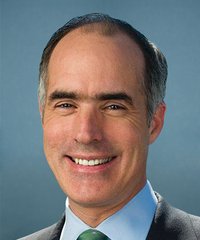
He is a strong advocate for policies that will raise wages for the middle class and improve early learning opportunities and health care for children. Senator Casey serves on four committees, including the Finance Committee, the HELP Committee, and the Select Committee on Intelligence. He is also the Chairman of the Special Committee on Aging, where his agenda is focused on policies that support seniors and individuals with disabilities.
Born and raised in Scranton, Pennsylvania, Senator Casey graduated from The College of the Holy Cross in 1982, and spent the following year teaching fifth grade and coaching eighth grade basketball in inner city Philadelphia for the Jesuit Volunteer Corps. He received his law degree from Catholic University in 1988, and entered the practice of law in Scranton. Senator Casey and his wife, Terese, live in Scranton and have four adult daughters.
Senator Casey believes that one of our Nation’s most important priorities is creating good-paying jobs and raising wages for workers and families. There are many components to building an economy that works for all Americans, and one vital element is trade.
When foreign nations cheat on trading practices, Pennsylvania workers lose their jobs. This is why we must have ironclad trade enforcement and fight against dumping, subsidies, and overcapacity. The challenges posed by non-market economies like China are not unique to the United States. They are global. As our Nation takes steps to protect Pennsylvania jobs and wages, we must also work with our allies toward a sustained and coordinated strategy to address these issues of mutual concern.
International trade that is fair can have substantial benefits for our economy and our workers. The only way to achieve fair trade is by holding accountable those nations that cheat, and taking commonsense steps to ensure that the bedrocks of our democracy are protected. Senator Casey continues to fight to ensure U.S trade policies align with our national priorities, including on labor, environment, climate change, and women’s economic empowerment, and that those trade policies support protections for workers’ wages and certainty for American farmers.
Pennsylvanians can outcompete anyone in the world when the playing field is level, and we must support and enact laws that help ensure it is.